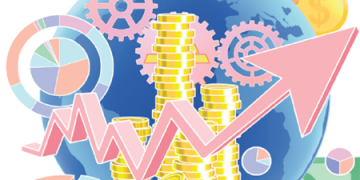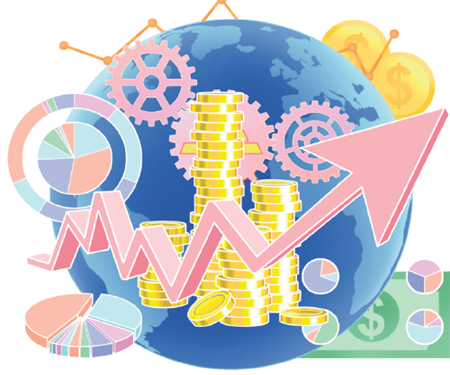China Daily
As the COVID-19 pandemic entered its third year, the United States was enjoying a protracted stock market boom, and China’s global trade surplus had reached a record high. There is reason to believe these trends will not last: notably because the US Federal Reserve is set to tighten monetary policy in the face of rising inflation, and the US stock market has tumbled.
But even if market ebullience or strong exports in the world’s biggest economies were to persist, most people are experiencing hardship and angst. We must not lose sight of that, let alone of the imperative of systemic change.
In responding to the pandemic, policymakers have faced an awful dilemma: keeping the economy open and risking more COVID-19 infections and deaths, or imposing lockdowns and destroying livelihoods. As the Vanderbilt University economist W. Kip Viscusi said, one way to simplify the tradeoff between the benefits of reducing health risks and the costs of economic dislocations is to “monetize” COVID-19 deaths.
Using the value of a statistical life (VSL) as the metric, Viscusi found that the cost of COVID-19 deaths in the first half of 2020 amounted to $1.4 trillion in the US and $3.5 trillion globally. Although the US accounted for 25 percent of deaths, its share of the global mortality cost was 41 percent, because richer countries have a higher VSL.
If one applies the same measure to officially reported deaths through the end of 2021-which total about 5.6 million-the mortality cost would be $38 trillion, or 40 percent of global GDP. If one takes the Economist’s estimate of actual deaths-close to 17 million-that figure soars to $114 trillion, or 120 percent of global GDP.
China approached the tradeoff very differently from the US, choosing to protect lives with strict lockdowns, even at the expense of greater economic dislocations. If China had the same infection rate as the US, and the same mortality rate (slightly more than 2.9 percent), its total COVID-19 deaths would have reached 4.1 million, rather than the 4,849 it has officially recorded. China’s VSL of $2.75 million implies that this would have meant additional losses of $11.3 trillion, or 67 percent of last year’s GDP.
Given that China’s economy has performed relatively well during the pandemic despite lockdowns, it seems fair to conclude that China’s approach led to lower overall costs. In any case, the actual costs of the COVID-19 pandemic are higher than VSL scores indicate. Aggregating mortality, morbidity, mental health conditions, and direct economic losses, former US treasury secretary Larry Summers and Harvard economist David M. Cutler estimate that the US bore losses of $16 trillion-the equivalent of 90 percent of GDP-in 2020.
Despite these high costs, the dilemma faced by a country such as the US or China is less stark than that faced by poorer developing economies. With large debts and limited ability to borrow, these countries’ governments have had few options for propping up their economies. And vaccine shortages and weak health systems have left them even more vulnerable.
The International Monetary Fund recently warned that, because of the pandemic, incomes in 40 fragile and conflict-affected states are falling even further behind the rest of the world. It is not difficult to discern why: such countries lack the institutional capacity or resources to manage or mitigate social, economic, political, security, or environmental risks effectively. Already, violence is at a 30-year high globally. Fragile states-home to nearly 1 billion people-may account for 60 percent of the world’s poor by 2030.
All of this is taking its toll on the global economy. The latest edition of the World Bank’s Global Economic Prospects report cautiously predicts that global growth will slow down from 5.5 percent in 2021 to 4.1 percent in 2022 and 3.2 percent in 2023. Behind this forecast are the threats posed by new novel coronavirus variants, rising inflation, mounting debt, widening inequality, and worrying security challenges.
Economists like Viscusi and Summers, and the IMF and World Bank staff measure policy options and their consequences in terms of monetary costs or GDP. But the dilemma policymakers face is fundamentally a moral one, rooted not least in the question of when individual preferences should prevail over collective interests.
Moreover, despite the apparent straightforwardness of cost-benefit calculations, the pandemic is ultimately a systemic challenge that is entangled with others, from inequality to climate change. And there are no simple solutions.
As Minouche Shafik, director of the London School of Economics and Political Science, recently argued, the pandemic has made plain the need for a new social contract fit for contemporary challenges.
The social contract we need must reflect the forces and values shaping the world we live in today, including the deep interconnections among our economies and societies, the inherent value of all humans, and the shared existential challenge of climate change. Today, the choice is not to dominate or be dominated; it is to work together or perish together.





